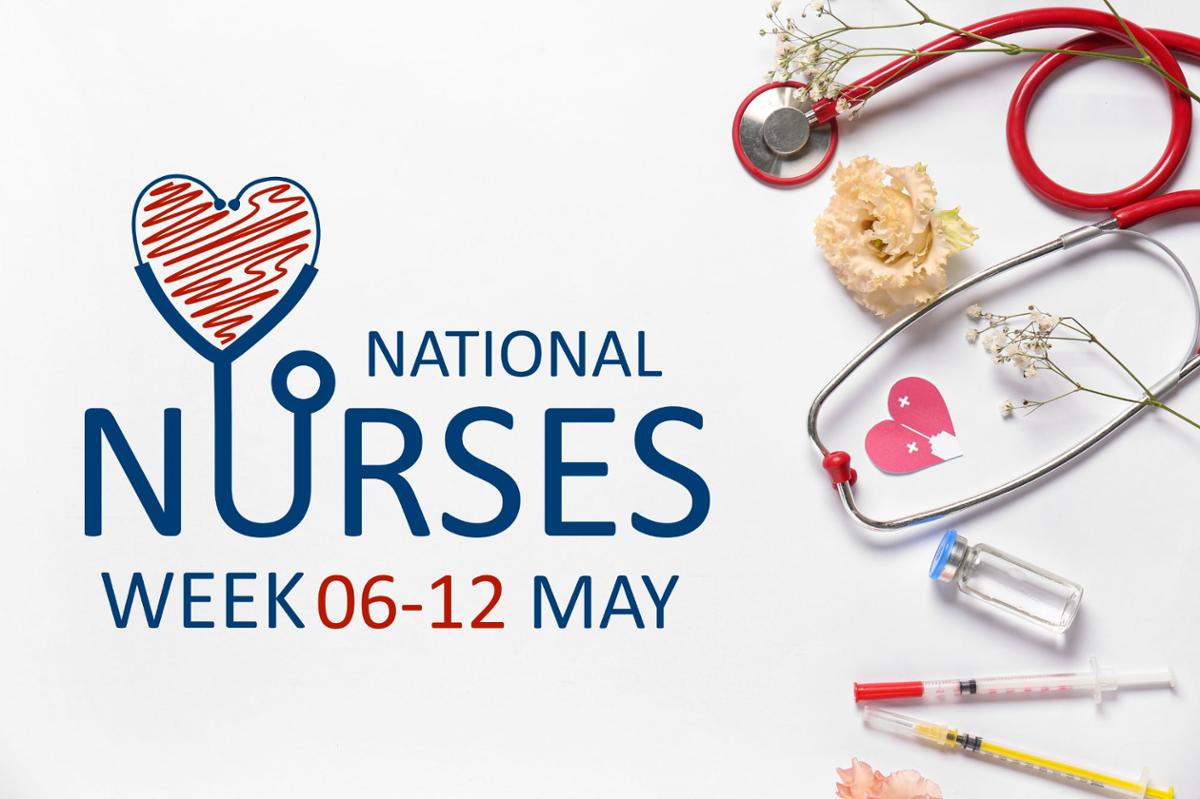National Nurses Week: Short History, Information, and a Retrospective of Events at Nightingale College in 2025

National Nurses Week is an annual celebration of nurses and the nursing profession, a time to recognize the vital contributions of nurses, students, and educators across the industry.
This week-long observance highlights nurses' essential role in protecting the health and well-being of individuals, families, and communities. It’s also a moment to honor their resilience, reflect on the challenges they face, and emphasize the value of nursing education in shaping the future of healthcare.
Explore our complete retrospective below to learn why National Nurses Week matters so much for us and how it was celebrated in 2025 at Nightingale College.

What Is National Nurses Week About?
National Nurses Week is an annual celebration in the United States that honors nurses' contributions, dedication, and lasting impact across healthcare settings and the communities they serve. The celebration is observed every year from May 6 to May 12, culminating on May 12, the birthday of Florence Nightingale, who is widely recognized as the founding figure of modern nursing.
During the celebration of Nurses Week, nursing education and healthcare institutions organize various events to highlight the importance of professionals and aspiring nurses alike, as well as our common commitment to honor their efforts and impact.
Beyond observance, Nurses Week is also about recognizing nurses' essential role in patient care, public health, and the medical field in general. Thus, the celebration helps us all remember that nurses represent a key part of the medical field and are vital for the well-being of every individual, in particular, and the community as a whole.
Finally, National Nurses Week offers an opportunity to address the many difficulties and issues that affect nurses and learners, explore actionable solutions, and provide material support to all who have chosen this cornerstone career.

A Brief History of National Nurses Week and the Life of Florence Nightingale
Although in the present, we celebrate Nurses Week every year, with its final day coinciding with Florence Nightingale’s birthday, there is a long history behind the recognition of the need for a celebration of nurses in the US and its officialization.
- First Proposal of a Nurse Day (1953): In 1953, Dorothy Sutherland, an official with the US Department of Health, Education, and Welfare, proposed the establishment and celebration of a Nurse Day to President Eisenhower. Although her proposal did not receive presidential approval, it is still remembered as the first major federal-level attempt at recognition for nursing as a profession.
- First National Nurses Week (1954): Despite the failure to officiate a federal celebration dedicated to nurses, the following year, the United States observed the first ever National Nurses Week to commemorate the 100th anniversary of Florence Nightingale’s service during the Crimean War (1853-1856). The week-long celebration in October was largely symbolic and did not repeat annually. However, its occurrence set the precedent for future efforts towards recognition and material support for nurses within a dedicated celebration. Additionally, it is the first event that links the celebration of nurses to the figure of Florence Nightingale.
- Resolution to Establish a National Registered Nurse Day (1972): Two decades later, the House of Representatives introduced a resolution to establish a National Registered Nurse Day, marking a milestone in the continued advocacy for nurse recognition. Despite the support in the House of Representatives, the resolution failed in the Senate, highlighting the persisting gap between the public and political recognition of the importance of nurses.
- Establishment of International Nurses Day (1974): The first significant and successful step towards the establishment of National Nurses Week as we know it today came in 1974, when the International Council of Nurses (ICN) officially declared May 12 as International Nurses Day. This was a global initiative that helped uplift the profile of nurses worldwide, while symbolically tying their recognition to the birthday of Florence Nightingale. International Nurses Day is still celebrated by many countries worldwide.
- Nixon’s Proclamation of National Nurse Week (1974): Also in 1974, President Richard Nixon issued a presidential proclamation to recognize National Nurse Week in the United States, a significant step as it brought formal recognition from the executive branch, affirming the value of the nursing profession in a public and political forum. However, the proclamation did not establish the week as a recurring or permanent event despite its importance. Nonetheless, it contributed to the gradual buildup of national momentum and advocacy, eventually leading to a sustained, annual celebration.
- Designation of National Recognition Day for Nurses (1982): In February 1982, after persistent efforts from the American Nurses Association (ANA) and other supporters of the profession, a joint congressional resolution was passed, calling for a specific day to honor nurses. In response, President Ronald Reagan signed a proclamation designating May 6 as "National Recognition Day for Nurses." This marked a key turning point in the history of Nurses Week, as it was the first official federal recognition of a day dedicated solely to nurses. May 6 would later become the anchor date for the start of what is now known as National Nurses Week.
- Expansion to a Full Week of Recognition (1990): The ANA expanded the existing recognition from a single day to a whole week, officially establishing National Nurses Week from May 6 to May 12. This development reflected the growing acknowledgment that a single day was insufficient to honor nurses' diverse and critical roles fully. The week-long structure allowed for greater participation from schools, hospitals, organizations, and the general public, fostering deeper engagement and appreciation throughout the healthcare community.
- Permanent Annual Designation of National Nurses Week (1993): Finally, by 1993, the ANA took the final formal step to make National Nurses Week a permanent and recurring celebration, observed annually from May 6 to May 12. This codification secured the week’s place on the national calendar and institutionalized the celebration within American culture. Since then, National Nurses Week has been celebrated every year, with dedicated themes, events, and activities meant to highlight the nursing profession's evolving challenges, achievements, and contributions.
The Life of Florence Nightingale: A Short Overview
Florence Nightingale (b.1820 – d.1910) is widely regarded as the founder of modern nursing, a transformational figure in the field of public health, and a promoter of hospital reform.
Nightingale was born into a wealthy British family in Florence, Italy, on May 12, 1820. Defying both class and gender expectations of her time and context, Nightingale pursued her calling to serve those in need through nursing, a profession which was then seen as lowly and irregular. Already educated in various languages, philosophy, and mathematics, the reason behind her decision to become a nurse in her 20s was, as she reported, a “divine calling”. She took to training in nursing in Germany, later working at a hospital for impoverished women in London.
However, Nightingale earned her historical reputation during her activity during the Crimean War (1853-1856), when she led a team of British nurses to the British military hospitals established in Scutari (modern-day Üsküdar, Türkiye). Shocked by the unsanitary conditions and high death rates, she instituted strict practices regarding hygiene, organized care systems, and basic sanitation measures. Her proposals and practice proved incredibly successful, reducing the mortality rate from 42% to 2%, an achievement that garnered national and international attention, also earning her the moniker of “the Lady with the Lamp” (inspired by her nightly rounds tending to wounded soldiers).
Following the war's end, Florence Nightingale used her fame and influence to push for reforms in military and civilian hospitals. Crucially, in 1860, she founded the Nightingale Training School for Nurses at St. Thomas’ Hospital in London, providing a cornerstone and foundation for professional nursing education. Additionally, Nightingale was also a innovator in what concerned nursing curricula (emphasizing training, ethics, discipline and patient-centered care – all representing key factors in nursing practice today), and health statistics and data visualization (using charts and diagrams to inform and influence public health policies, as well as improve conditions in hospitals across Britain and its colonies).
Though affected by illness later in her life, Florence Nightingale continued to write, research, and advise on health reform, an inspiring showcase of sacrifice and dedication to nursing. Notably, she became the first woman to be awarded the Order of Merit by the British Government in 1907.
Why Is Florence Nightingale So Important for Nursing Today?
Before Florence Nightingale, nursing was not yet seen as a definite, organized, and, most importantly, respected profession. However, her implementation of specific hygiene practices, sanitation protocols, and structured care routines showed the world that nursing could save lives and make a difference in the broader healthcare field.
Her decisive involvement in transforming battlefield hospitals during the Crimean War revealed the effects and benefits of nursing as a structured occupation with an industry behind it on a large scale. In short, Nightingale showed that nursing is equivalent to saving lives. Beyond her role as a trailblazer, Florence Nightingale is a symbol of dedication to care, active interest in advancing the profession, and perseverance, even when no clear road is laid ahead, continuing to inspire nurses, students, and nursing educators alike.
The Importance of National Nurses Week
National Nurses Week is more than just a celebration. It also serves as a crucial period to acknowledge, empower, and support those who form the backbone of healthcare.
From aspiring nurses just beginning their journey to seasoned professionals on the front lines, the week offers the ideal opportunity for reflection, recognition, and renewed focus on the needs of the nursing community. It also marks a key moment for building better relationships between nurses of various backgrounds and walks of life, other professionals collaborating with them, and aspirants taking the first steps in their nursing journey. A celebration of the past, present, and future of nursing, National Nurses Week is the ideal occasion to show gratitude to those who laid the foundation, talk about the state of nursing today, and envision a better future for each nurse and the industry as a whole.
Providing Appreciation and Support for Future Nurses
National Nurses Week is an ideal opportunity to encourage and nurture the next generation of nurses. By shining a light on nurses' impact in every healthcare setting, this celebration inspires students and career changers to consider nursing a meaningful and essential profession.
During this week, institutions often promote or launch initiatives such as:
- Scholarships and grants that ease the financial burden of nursing education
- Mentorship programs that connect current professionals with students and new graduates
- Workshops, webinars, and educational resources that equip future nurses with tools for academic and clinical success
- These efforts are vital to building a resilient nursing workforce for the future—one that is skilled, compassionate, and well-prepared to meet evolving healthcare demands.
The activities taking place at Nightingale College during National Nurses Week stand as proof of our continuous and unwavering commitment to empower the next generation of nurses and enable learners from all walks of life to embark on the exciting journey of a nursing career. Knowing that support and interest in the well-being and future of aspiring nurses cannot stop only at celebrating Nurses Week, we ensure that the learners enrolled in our academic programs receive the necessary services and resources, including academic coaching, throughout their learning journey and beyond. Additionally, we aim to promote excellence in the field by awarding scholarships and financial support to our learners.
Recognizing the Role Nurses Play in the Industry and Our Communities
Nurses are the cornerstones of the entire healthcare ecosystem, with roles extending beyond hospital and clinical settings, into homes, schools, academic institutions, public health agencies, and underserved communities. Their activity and dedication positively impact individuals, families, communities, and our society as a whole, and National Nurses Week is the right time to highlight just how vital that impact is.
Nurses are the first and last points of contact for patients in clinical settings. However, their scope of practice has them provide support throughout their treatment, from managing chronic conditions to establishing diagnostics and treatment plans, all the way to administering medication and overseeing their recovery. They also have an active role in maintaining a clear line of communication between patients, caretakers, and families and advocating for their needs.
Beyond their bedside practice, nurses are leadership figures in preventive care, frontline workers during public health crises, active contributors of innovation in the healthcare industry, and, most importantly of all, advocates of equity in healthcare administration and distribution, with a direct impact on the improvement of services to underserved populations.
National Nurses Week is the main opportunity for the multifaceted and multidimensional impact of nurses to be highlighted and acknowledged by all stakeholders and the society at large. This role is both broad in scope and decisive for our day-to-day well-being.
Seeing Nurses as Employees and Understanding Their Needs
Although nurses are often celebrated for their compassion, resilience, and skill, it is just as important to recognize them as employees and professionals with complex roles and demanding working conditions.
National Nurses Week is just the right moment to honor their contributions and bring the conversation about the support they need as employees within healthcare systems to the forefront.
Nurses today face a range of workplace challenges that directly impact their well-being and the quality of care they can provide:
- Staffing shortages remain one of the most pressing issues in the industry, leading to heavier workloads, longer shifts, and increased stress levels for nurses.
- Nursing burnout and compassion fatigue are widespread, exacerbated by high patient demands, emotional tolls, and limited recovery time.
- Career advancement opportunities and continuing education often prove challenging due to time constraints and financial limitations. Yet they are essential for maintaining licensure and staying current in a rapidly evolving field.
- Nursing career ladders, or formalized and clear ways to advance and pursue excellence in nursing, are as crucial to the industry as they are scarce.
- Workplace safety, both physical and psychological, is a growing concern, particularly in high-intensity environments such as emergency departments or long-term care facilities.
Recognizing these realities allows healthcare organizations, policymakers, and the broader public to shift from mere symbolic appreciation to structural support and actionable initiatives, which include offering fair compensation, ensuring adequate staffing levels, providing access to mental health resources, and launching new opportunities for professional growth.
Building a Community and Stronger Bonds in the Nursing Industry
While society-wide recognition is essential, National Nurses Week is also an opportunity for professionals in the field, aspiring nurses, and educators to form stronger, life-long bonds and explore ways to improve solidarity and foster greater unity in the industry.
As nurses work in high-stress environments for long periods, their usual experience in their respective work settings hardly leaves room for connecting with their immediate teams or the broader community of nurses. The National Nurses Week is a period of encouragement toward reflection, collaboration, and mutual recognition that go beyond the typical day-to-day activities of a nurse. It is also a unifying celebration that fosters solidarity across work settings, specialties, and regions, reminding every nurse, student, and stakeholder that the nursing industry is all about community and cooperation.
That is why many events during Nurses Week revolve around recognition, continuing support, mentorship, and the reinforcement of the common mission of nurses nationwide (and even beyond). Interprofessional connections and knowledge exchange go a long way toward strengthening nurses' resilience and emotional support networks. Still, they also go beyond, improving patient outcomes and the quality of care through better collaboration.

National Nurses Week at Nightingale College
National Nurses Week at Nightingale College is not just a celebration, but a week-long showcase of community, learning, and gratitude, highlighted via immersive activities and rewards.
From May 6 through May 12, we engaged our learners, alumni, faculty, and friends alike across social media and physical events in order to honor and show gratitude for nursing’s past, present, and future.
Here is a brief retrospective of the National Nurses Week events at Nightingale College:
Lending a Voice to Nurses and Ambassadors
Throughout Nurses Week, our Learner Ambassadors took over Nightingale College’s Instagram and YouTube channels to share A Day in the Life, spotlighting many insights, clinical rotations, study strategies, and valuable reflections on the enduring influence and inspiration of Florence Nightingale.
Spotlight on Perseverance in Nursing Education
Additionally, we spotlighted one of our alumni's journeys to center the stories of nurses, particularly those from non-traditional groups. When Bryan O’Neill set his sights on nursing, he endured seven rejections from nursing schools. Bryan, a former firefighter in Coeur d’Alene, Idaho, refused to give up. He said, “Failure happens, but learning how to overcome and adapt makes you a better nurse and a better parent.”
Having to balance a growing family – his wife is a PA, and they have three young children – Bryan chose Nightingale’s online RN program because of its flexibility. He graduated with honors, passed the NCLEX on his first try in February 2025, and credits our NCLEX success coaching and rigorous coursework for his success.
Today, Bryan serves as Lead Esophageal Manometry Nurse at Northwest Digestive Center and has secured an ICU role among 40 applicants. His advice to aspiring, particularly male nurses: “Find the field that works for you… The possibilities are endless if you dedicate yourself.”
Trivia Activities, Giveaways, and Discounts
Each morning, we posted a fun nursing-themed trivia question on Facebook and Instagram, ranging from Nightingale’s innovations in sanitation and nursing to modern scopes of practice. Participants earned digital badges and entered the daily drawing for College swag.
Nurses also enjoyed an exclusive 20% discount at the Nightingale Shop with our institutional code, making it easy to pick up branded scrubs, stethoscope charms, and study aids as tokens of appreciation.
To strengthen the community of past, present, and future nurses, we organized a Giveaway where our followers tagged a nurse who inspires them on the giveaway posts and told us why. Here are a few inspiring words from participants:
- “I graduated from Nightingale in December 2024, and now my best friend is starting her journey there this fall. We’ve supported each other from LVN to RN, and I’m so excited to see her thrive just like she did for me.”
- “My mom has always been my biggest inspiration—she’s not a nurse by title, but her compassion, strength, and care sparked my passion for nursing. She showed me what it means to serve others.”
- “From CNA to LVN and now RN student, my nursing journey has been filled with amazing women who supported me every step of the way. I can’t wait to cheer them on as they take the next step, too.”
- “I was terrified of my first big exam last semester, but my professor made all the difference. Her encouragement kept me grounded, and my academic strategist gave me the confidence to keep going.”
- “A friend of mine managed to complete nursing school while being a mom and working full-time. Her dedication showed me what’s possible, and now I’m inspired to follow in her footsteps.”
- “My study group means the world to me. Each of these women brings their own story and strength, and together, we’ve built more than just good habits—we’ve built sisterhood.”
- “As a single mother of three, my kids are my motivation. Every step I take in my nursing journey is for them, and I’m showing them that it’s never too late to chase your dreams.”
- “My aunt has been a nurse for over 15 years. Her stories of care and compassion showed me the true heart of nursing and inspired me to lead with empathy on my own path.”
- “I used to complain about studying Florence Nightingale’s theories, but her legacy honestly inspired me. She turned data and hygiene into a global movement—and that kind of vision is why I’m proud to be entering this field.”
The winners were randomly selected and received prizes after National Nurses Week concluded.
Honoring Our Forerunner
On May 12, we posted a commemorative tribute to Florence Nightingale across all channels. This annual, organically shared post reminded our community of her pioneering work in the Crimean War, her use of statistics for public health reform, and her founding of the first nursing school in 1860, tying her legacy directly to our mission today.

What Can You Do for Nurses Week?
Whether you are a learner, a working nurse, or simply someone who wants to show support and recognition for the community of nurses, National Nurses Week offers you a chance to express your gratitude, build meaningful relationships and connections in the industry, and showcase your experience and involvement in the field of nursing.
- As a learner in nursing school, you can organically connect with your mentors, whether your clinical instructors, preceptors, or nursing students, by sharing a note of appreciation in private or through social media and other channels. The celebration is also an opportunity to connect with professionals who serve as models for your journey to becoming a nurse. Lastly, you can use the events and activities occurring during National Nurses Week to strengthen the ties with your peers by recognizing fellow learners who have helped you through tough semesters and encouraging others to build the resilience that has gotten you through the more challenging times.
- As a nurse, you can use the time to practice self-recognition and acknowledge your growth and accomplishments. Nurses Week is also an ideal opportunity to increase the bonds among working professionals and support your colleagues by showing appreciation and highlighting their strengths and importance in the workplace. Additionally, use the celebration to use your experience and knowledge to guide aspiring nurses in pursuing the arduous journey ahead of them.
- If you simply want to show your support and appreciation, take the time to thank a nurse who has made a difference in your life, or give them a thoughtful gift. Recognition efforts for nurses do not stop at advocacy from within the industry, and you can use your voice and platform to increase public awareness around issues affecting nurses and support policies that improve nurse staffing, working conditions, and wages.
Regardless of your relationship with nursing or how you show your appreciation for the profession, Nurses Week is an opportunity to lift nurses, highlight their importance, and center their voices and experiences. However, your actions do not need to be grandiose – sometimes a kind word, a small gesture, or the mere amplification of a nurse’s story can go a long way. Perhaps, the most crucial way to celebrate nursing, particularly if you aspire to pursue it as a career, is to gather the courage and take the first steps in achieving your dream. Becoming a nurse can seem like a daunting task that not many can complete. However, you should take the time during Nurses Week to balance the challenges of choosing nursing as a profession with its benefits, both personally and to the community as a whole. Naturally, we are here to help you every step of the way, and if you enroll in one of our academic programs, you will receive all the resources and support services that you need to reach your full potential in the most flexible and accessible way.
Learn more about the learner experience at Nightingale College and pursue your aspirations.
We know all too well how important it is to have a set time for showing our appreciation for nurses, both working and aspiring, the industry, and all its stakeholders. That is why, at Nightingale College, we consider Nurses Week essential and aim to make it as memorable as possible for our learners, alumni, faculty, and staff.
Frequently Asked Questions About National Nurses Week
When Is National Nurses Week?
National Nurses Week is celebrated every year from May 6 to May 12, culminating with Florence Nightingale’s birthday. Additionally, every day of Nurses Week highlights a different aspect of the nursing profession. Here is the typical breakdown followed by most institutions in 2025:
- May 6 – National Nurses Day
- May 7 – National Student Nurses Day
- May 8 – National School Nurse Day (usually celebrated on the Wednesday of Nurses Week)
- May 9 – Nursing Education Day
- May 10 – Nurse Wellness Day
- May 11 – Nurse Leadership Day
- May 12 – International Nurses Day and Florence Nightingale’s Birthday
Is Nurses Week the Same Week Every Year?
Yes, National Nurses Week has been established as a yearly week-long nationwide celebration since the 1990s, scheduled to coincide with Florence Nightingale’s birthday.
Why Is Nurses Week Important?
National Nurses Week plays a crucial role in recognizing nurses' profound impact on the health and well-being of individuals, families, and entire communities. It highlights their essential presence in clinical settings and honors the collective contributions of nursing professionals to the healthcare field. Rooted in the celebration of Florence Nightingale’s birthday, widely regarded as the founder of modern nursing, this week also acknowledges the long-standing efforts to gain societal recognition for the nursing profession, its value, and the challenges nurses continue to face in their practice.
What Is the Theme of National Nurses Week in 2025?
The 2025 theme of Nurses Week was “The Power of Nurses”, celebrating nurses' strength, impact, and leadership. The American Nurses Association (ANA) establishes a theme for the celebration every year to highlight the most critical aspects of the nursing profession.
What Is the Best Gift for Nurses Week?
Some meaningful gifts that you may consider for National Nurses Week include personalized thank-you notes, self-care items or experiences, gift cards, or tokens of appreciation that acknowledge your fellow nurses' hard work and dedication. Remember that this celebration is principally about recognizing the impact of nurses and supporting them in their efforts to serve their peers and communities. Thus, symbolic gestures amplifying their voices and stories can be just as important as a gift.

